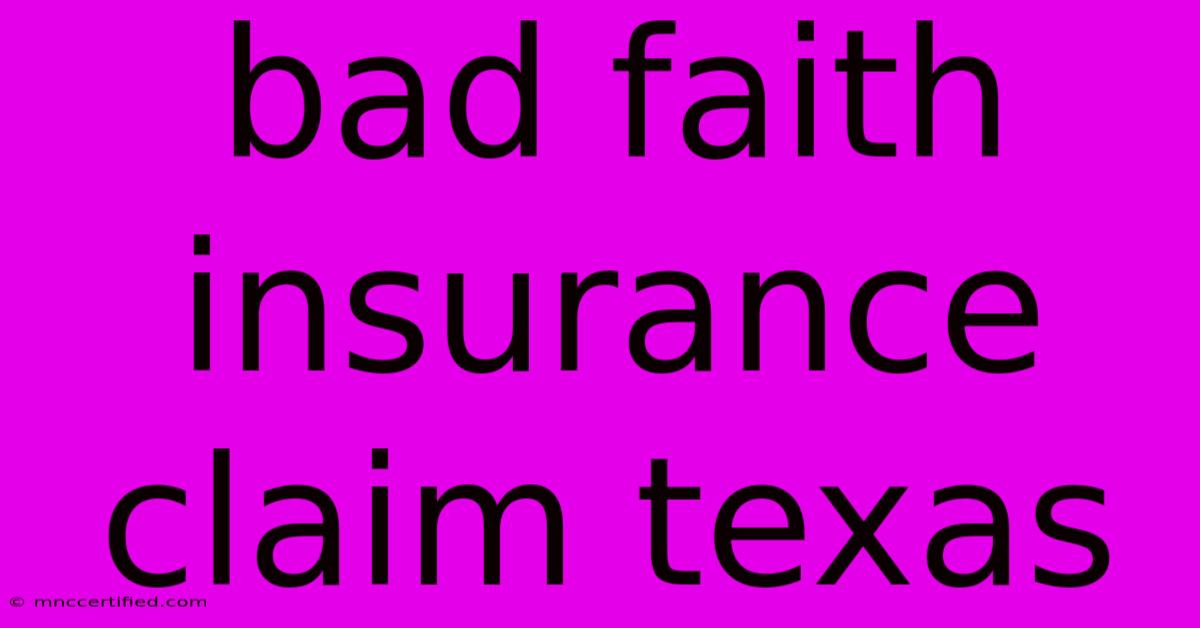Bad Faith Insurance Claim Texas

Table of Contents
Navigating Bad Faith Insurance Claims in Texas: A Comprehensive Guide
Filing an insurance claim after an accident or property damage is already stressful. Dealing with a seemingly uncooperative insurance company adds another layer of frustration. In Texas, this frustrating experience might indicate a bad faith insurance claim. Understanding what constitutes bad faith and how to pursue your rights is crucial for policyholders. This guide will equip you with the knowledge to navigate this complex legal terrain.
What is Bad Faith in Texas Insurance Claims?
In Texas, an insurance company acts in bad faith when it unreasonably denies or delays the settlement of a legitimate claim. This isn't simply a disagreement over the claim amount; it involves a demonstrable failure to act fairly and reasonably, violating the implied covenant of good faith and fair dealing inherent in the insurance contract. This can manifest in several ways, including:
Common Indicators of Bad Faith in Texas:
- Unreasonable Delays: Prolonged delays in investigating a claim, processing payments, or responding to communications without valid justification.
- Unjustified Claim Denials: Rejecting a legitimate claim without proper investigation or providing insufficient reasons for denial.
- Failure to Investigate: Neglecting to thoroughly investigate the claim, failing to gather necessary evidence, or ignoring crucial information provided by the policyholder.
- Lowball Offers: Offering significantly lower settlements than the actual value of the claim, often based on inadequate assessments or incomplete investigations.
- Failure to Communicate: Ignoring or avoiding communication with the policyholder, failing to respond to inquiries, or providing misleading information.
- Unreasonable Demands for Information: Requesting excessive or irrelevant documentation from the policyholder, creating unnecessary obstacles in the claims process.
- Improper Use of Adjusters: Employing unqualified or inexperienced adjusters, or those with known biases.
Proving Bad Faith in Texas: Gathering Evidence
Successfully proving bad faith requires strong evidence. Document everything:
- Maintain Detailed Records: Keep copies of all correspondence, emails, claim forms, medical records, repair estimates, and any other relevant documents.
- Document Communication: Record the dates and times of all phone calls, and keep notes of conversations with insurance adjusters.
- Seek Independent Appraisals: Obtain independent evaluations of damages to support your claim and refute lowball offers. This is especially crucial for property damage claims.
- Expert Testimony: Depending on the complexity of the claim, expert testimony from accident reconstructionists, medical professionals, or insurance claim specialists might be necessary.
Pursuing Legal Action: Your Rights in a Texas Bad Faith Claim
If you believe your insurance company acted in bad faith, you have legal recourse. You can file a bad faith lawsuit against the insurer. This involves demonstrating the insurer's breach of the implied covenant of good faith and fair dealing. Success in these cases often hinges on proving:
- The existence of a valid insurance policy.
- The occurrence of a covered event under the policy.
- The insurance company's unreasonable conduct in handling the claim.
- Damages suffered as a direct result of the insurer's bad faith actions.
These damages can include:
- Actual damages: The amount the insurance company should have paid under the policy.
- Punitive damages: Intended to punish the insurer for their egregious conduct and deter future bad faith actions (these are awarded less frequently).
- Attorney's fees: The court can order the insurer to pay your legal fees.
Finding Legal Representation: Texas Bad Faith Lawyers
Navigating a bad faith insurance claim in Texas is complex and requires the expertise of a qualified attorney experienced in insurance law. A skilled Texas bad faith lawyer can help you:
- Investigate your claim thoroughly.
- Build a strong case.
- Negotiate with the insurance company.
- Represent you in court if necessary.
Disclaimer: This article provides general information and should not be considered legal advice. Consult with a qualified Texas attorney for advice specific to your situation. The information presented here is for educational purposes only.

Thank you for visiting our website wich cover about Bad Faith Insurance Claim Texas. We hope the information provided has been useful to you. Feel free to contact us if you have any questions or need further assistance. See you next time and dont miss to bookmark.
Featured Posts
-
Detour Travel Insurance Reviews
Nov 23, 2024
-
2 1 2 Dollar Gold Coin For Sale
Nov 23, 2024
-
Bond Place Hotel Toronto Canada
Nov 23, 2024
-
Zebec Protocol Price Prediction
Nov 23, 2024
-
Second Nature Renters Insurance
Nov 23, 2024